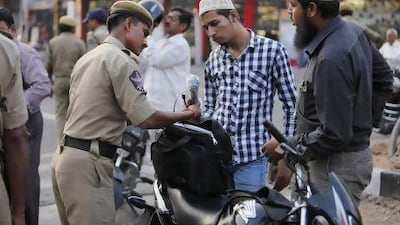NEW DELHI // Indian investigators have made little headway in identifying the perpetrators of Thursday night's twin bomb blasts in Hyderabad, which killed 16 people.
The investigation has been further muddied by the receipt of a letter, allegedly from the Pakistan-based terror outfit Lashkar-e-Taiba, claiming responsibility for the attacks and threatening Hyderabad's Begum Bazaar next.
The letter was received on Sunday by G Kishan Reddy, the state chief of the Bharatiya Janata Party (BJP), and is now with the Hyderabad police.
No other group has claimed responsibility for the bomb attacks. But the modus operandi - involving improvised explosive devices placed on parked bicycles in the middle of crowded areas - has suggested the handiwork of Indian Mujahideen, which has carried out similar attacks in the past.
In August 2007, Indian Mujahideen executed two bomb attacks in Hyderabad. A third bomb - planned to detonate in Dilsukhnagar, the site of Thursday's blasts - was defused.
On Sunday, Sushilkumar Shinde, India's home minister, suggested that the blasts were retaliation for the recent hangings of Ajmal Kasab and Afzal Guru. Kasab was convicted of participating in the 2008 Mumbai attacks, while Guru was convicted of conspiring to attack the Indian parliament in 2001.
"We were expecting that after the two executions, some reaction had to come," Mr Shinde said.
Mazher Hussain, the executive director of the Hyderabad-based Confederation of Voluntary Associations, which promotes dialogue between the city's religious groups, agreed that the Guru execution might have been a trigger, although he said that it was "still too early to say what was the motivation behind this attack".
His city has been experiencing communal tensions, Mr Hussain said. "Hyderabad has been the centre for ongoing minor riots and hate speech," he said. "It might be that, preparatory to the 2014 [general] elections, this was done to polarise votes."
In his news conference, Mr Shinde added that investigating teams had gathered evidence at the blast site "and tests are being done in the forensic laboratory". "Soon we will get the results and the culprits will be booked," he said.
Over the weekend, the Hyderabad police department released grainy images from closed-circuit television cameras near one of the blast sites. In the images, a man who appears to be in his early thirties arrives on an old bicycle, with a bag slung around its carrier, at 6.38pm. The bicycle is parked, the man leaves on foot, and an explosion follows 20 minutes later.
In the footage, when the bomb goes off, a brief but intense fireball is seen to the right of the frame and the camera shakes momentarily.
Parts of the bicycle were recovered by investigators after the explosion.
No arrests have been made so far. But Asaduddin Owaisi, a member of parliament from Hyderabad and head of the Majlis-e-Ittehadul Muslimeen political party, said the police were in danger of revisiting old mistakes in trying to crack the case.
Mr Owaisi said yesterday that investigating teams had been calling on young Muslim men who had been detained six years ago, after a bomb killed 16 people in the Mecca Masjid complex in old Hyderabad.
"At that time, after going through beatings and everything, these boys were given compensation and a certificate of good character by the government," Mr Owaisi said. "So why are these same boys being called in again now?"
Ever since the blasts took place, Mr Owaisi said, "these boys have been living in fear".
"They have been calling me and asking: 'Should we stay here or should we go somewhere?' If they had something to do with it, would they have been sitting at home waiting for the investigators to come and visit them?
"This is not a professional way of doing things," Mr Owaisi added. "They're beating around the bush, using the same old methods, and getting nowhere."

